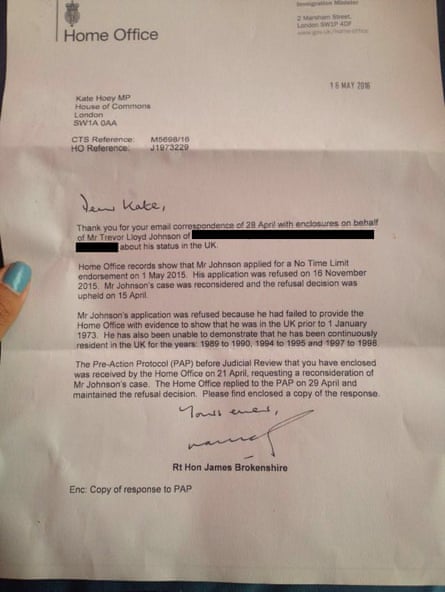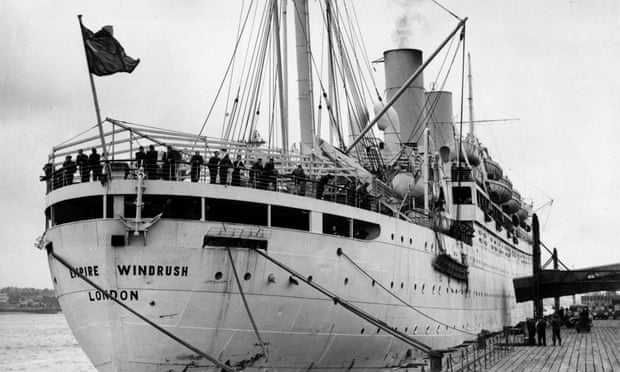A letter from a Home Office minister dated May 2016 and obtained by the Guardian shows that the government has known for years about the impact of its “hostile environment” policy on the Windrush generation.
As the government struggles to contain mounting pressure on both Theresa May and the home secretary, Amber Rudd, Home Office sources indicate that legislation could be rushed through parliament to give citizenship to those affected.
Q&ATimeline of the 'hostile environment' policy
Show
2012: Home secretary Theresa May: 'The aim is to create here in Britain a really hostile environment for illegal migration.'
2012: Hostile environment working group established, involving many government ministers.
2013: Sarah Teather MP raises concerns about the working group and its stated aims.
2013: Government introduces bill which became the Immigration Act 2014, and introduces key measures of the hostile environment.
2014: Chasing Status warns of a 'virtually invisible and rarely acknowledged group who can’t easily prove their legal status'. Home Office responds: 'It is up to anyone who does not have an established immigration status to regularise their position – however long they have been here'.
2014: Civil society organisations brief parliament during the passage of the 2014 Immigration Act that 'individuals often do not have any identity documentation or confirmed status but have a right to remain in the UK'.
2014: Impact assessments of a Right to Rent scheme warn: 'Some non-UK born older people may have additional difficulties in providing original documentation.' Officials respond that work had been done to ensure checks 'do not have an adverse impact on any age group'.
2016: A letter from immigration minister James Brokenshire reveals he knew of a Windrush victim having extreme difficulty proving he had arrived in the UK before 1971, and knew repeated legal action had been mounted to persuade the Home Office to recognise the rights of a man who had lived here for 49 years.
2018: A Liberty and the Joint Council for the Welfare of Immigrants dossier sets out many warnings received by the government regarding the impacts of its policies.
The letter the Guardian has obtained relates to Trevor Johnson. In a story that has shocked even veteran immigration rights campaigners, both Trevor and his brother Desmond have had their lives wrecked by hostile environment policies.
They arrived as boys from Jamaica in 1971. Trevor has faced threats of deportation, while Desmond has not been allowed to visit Britain, where he has a daughter as well as a brother, since he went back to Jamaica for his father’s funeral in 2001. Desmond has not seen his daughter for 16 years.
The letter was sent by James Brokenshire, immigration minister from 2014 to 2016, to Kate Hoey, the Labour MP who had raised the case of Trevor, her constituent.
The letter set out that Johnson was liable to be deported despite having lived in Britain for 45 years because he could not show that he had arrived before 1973, when the law changed. Nor could he provide the documentary evidence the Home Office demanded of continuous residence over other periods in the 1980s and 1990s.
In 2014 he was told he was here illegally, and his benefits were stopped.
Asked about the letter on ITV’s Peston on Sunday programme, Brokenshire – who is now on the backbenches and has been receiving treatment for lung cancer – said he had not seen the letter before.

He said, however, that he had always tried to be compassionate. “We did, as a Home Office, look compassionately over a number of individual cases. And you do try to make the right decisions. It is about being firm but fair. And I think that’s the issue that’s been striking for me.”
Ministers insist that the Windrush victims are suffering from a failure at official level, not from a bad policy in and of itself. The justice secretary, David Gauke, has said that the flaws were in the implementation.
“It is right that we take illegal immigration seriously – of course I stress we are not talking about illegal immigrants in the Windrush case – but it is perfectly reasonable to, for example, want to ensure that when we are providing public services they are being provided to people who are entitled to them,” he told the BBC’s Andrew Marr Show.
“The objective was for this to be focused on illegal immigration … most people … believed it would be possible to tighten up the provision of public services without there being an impact on people here legally.”
A former cabinet minister, Sayeeda Warsi, has said however that there was bitter opposition in cabinet to some of the policies May pursued while she was home secretary between 2010 and 2016.
Warsi, who is also a former Conservative party chair, told ITV’s Peston on Sunday it was a failed policy caused by the party’s obsession with bringing down net migration. “I think we were all responsible. I would hold myself responsible as part of the government,” she said.
“What happened unfortunately during those years and has continued is that we had an unhealthy obsession with numbers. We were wedded to unrealistic targets, targets that we still haven’t met unfortunately a decade on, and yet we continue to remain wedded to targets.
“And what we ended up with was, I think, the unintended consequences of the policy we are now implementing.”
Warsi’s remarks, which reinforce criticisms made before the weekend by the former deputy prime minister Nick Clegg, who chaired the cabinet subcommittee on immigration from 2010 to 2015, undermine Rudd. The home secretary has insisted that the problem was merely that officials lost sight of people in their concern for implementing the policy.
Rudd was further embarrassed when the Guardian was passed a document she sent to May pledging to escalate the hostile environment. In it she set out her “ambitious” plan to increase removals and focus officials on “arresting, detaining and forcibly removing illegal migrants” while “ruthlessly” prioritising Home Office resources for the programme.
The shadow foreign secretary, Emily Thornberry, told Nick Robinson on the Marr show that there was something “rotten at the heart of government”, and called for Rudd to resign. She said: “People have died, people have lost their jobs, lost their futures. People working in the National Health Service all their lives suddenly lose their jobs.
“It could not be worse and yet the home secretary thinks, ‘I can apologise and it will be all right.’ Well, it won’t be. I really think she should quit.”
The Joint Council for the Welfare of Immigrants and the civil rights organisation Liberty are demanding that an independent commission is be set up to review the workings of the Home Office and the legal framework of the “hostile environment” policy.
After an unsatisfactory meeting with May last week where they say there was no sign that there would be a proper investigation, the two organisations have released a dossier written in 2014 showing clearly how many warnings the government received about the impact of its policies.
In further evidence that the government has been aware for many years of the problems experienced by children of Windrush immigrants, a blog from as long ago as May 2013, written by a Foreign Office official responsible for resettling deported Jamaicans, is still on the ministry’s website. “Many consider themselves British, having moved to the UK as a young child with their parents or grandparents and granted indefinite leave to remain [ILR].”
Q&AWhat is the Windrush deportation scandal?
Show

Who are the Windrush generation?
They are people who arrived in the UK after the second world war from Caribbean countries at the invitation of the British government. The first group arrived on the ship MV Empire Windrush in June 1948.
What happened to them?
An estimated 50,000 people faced the risk of deportation if they had never formalised their residency status and did not have the required documentation to prove it.
Why now?
It stems from a policy, set out by Theresa May when she was home secretary, to make the UK 'a really hostile environment for illegal immigrants'. It requires employers, NHS staff, private landlords and other bodies to demand evidence of people’s citizenship or immigration status.
Why do they not have the correct paperwork and status?
Some children, often travelling on their parents’ passports, were never formally naturalised and many moved to the UK before the countries in which they were born became independent, so they assumed they were British. In some cases, they did not apply for passports. The Home Office did not keep a record of people entering the country and granted leave to remain, which was conferred on anyone living continuously in the country since before 1 January 1973.
What did the government try and do to resolve the problem?
A Home Office team was set up to ensure Commonwealth-born long-term UK residents would no longer find themselves classified as being in the UK illegally. But a month after one minister promised the cases would be resolved within two weeks, many remained destitute. In November 2018 home secretary Sajid Javid revealed that at least 11 Britons who had been wrongly deported had died. In April 2019 the government agreed to pay up to £200m in compensation.
By the end of 2020, victims were describing the long waits and 'abysmal' payouts with the scheme, and the most senior black Home Office employee in the team responsible for the Windrush compensation scheme resigned, describing it as systemically racist and unfit for purpose.
The blog does not address policy issues, but it shows clearly that there were recognised and worrying issues related to Home Office policy.
On Sunday night an email from a junior government whip, Mike Freer, the MP for Finchley, emerged in which he dismissed any government responsibility and instead blamed Labour.
“It is so sad that opposition parties would seek to deliberately misquote and misinterpret what Theresa May said. The Windrush issue is absolutely nothing to do with immigration reforms introduced under the Cameron government. Then the policy was to make it harder for ILLEGAL immigrants to settle in the UK. The Windrush people were and are legal. Wholly separate and unconnected.
“I would also point out that the decision to destroy the landing cards of the Windrush people was taken by the last LABOUR Government, so it really is the height of opportunism and hypocrisy for the Opposition to take some moral high ground.”
Freer has not responded to requests for a comment.
